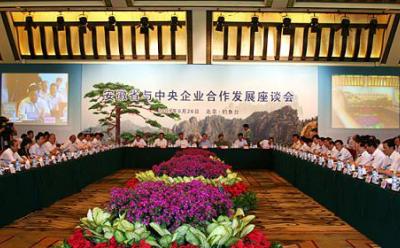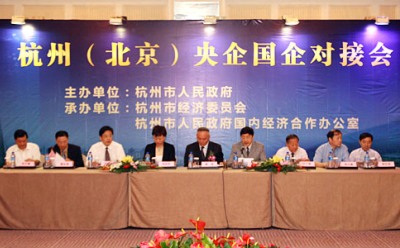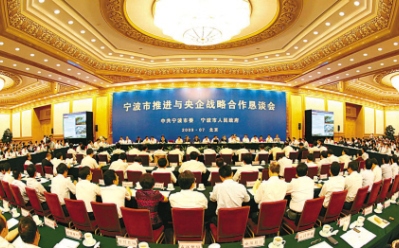

Translated by Liu Peng
News, page 8, issue 436, September 14 2009
Original article: [Chinese] 
In scenes reminiscent of the flood of local government representatives that poured into the capital last year scrambling to obtain approval for projects tied to the stimulus spending program, local government officials are once again swarming the capital - but this time they're not lining up to meet officials at China's top central planning body, they've got their eyes on centrally-owned enterprises (COE).
The Economic Observer has learned that from early September, local officials once again began heading to the capital, this time to seek investment from Beijing-based COE.
Recent warnings from the State Council of overcapacity in certain sectors have led local officials to seek out central partners to provide some kind of political cover that they hope will protect them from any central government crackdown and also hold them in better stead for what they consider will be a new industrial landscape dominated by large centrally-owned players.
Swarming Beijing
By September 10, a comprehensive team of officials from Anhui province's development and reform commission and other government bodies had already arrived in Beijing. These officials were in town in order to lobby various COE to sign investment projects worth at least 300 billion yuan with Anhui province before October 25.
Actually, prior to Anhui, Hunan province had sent a high-profile lobby team headed by its vice provincial governor Chen Zhaoxiong, to Beijing to meet with COE in early
September. The team's goal was to seek investment in local enterprises from COE.
At the same time, Henan's Anyang municipal government gave a presentation to various Beijing-based COE on September 4 about existing investment opportunities. Through the presentation, Anyang was able to secure over 30 billion yuan of investment funds from COE.
The EO learned that at least ten provinces such as Hebei, Jiangxi, Jiangsu and Gansu had all launched similar campaigns.
An official from Hubei Development and Reform Commission said "It's the trend of the times to seek cooperation with COEs to promote local development."
There are two main reasons for the local governments' recent actions. One is that following the central governments allocation of four batches of investment funds, local governments have found themselves short of the funds needed to meet the central governments investment. The other reason is that due to the central authorities recent moves to rein in overcapacity, local governments are attempting to protect their projects by seeking cooperation with COE and thus hope to provide some kind of "central cover" to their project.
Anhui's Deadline
As of September 8, three of the seventeen Anhui cities that are planning to come to the capital to seek funding, had already dispatched working teams to Beijing.
In order to inspect the various local governments' progress in contacting COE, Huang Haisong, vice governor of Anhui province, paid a personal visit to Beijing on September 8.
The EO learned that Huang ordered all local governments to appoint a vice mayors to take charge of contacting COE and of monitoring investment trends.
According to the province's preliminary goal, local governments, collectively, should secure at least 300 billion yuan worth of investment projects from COE before October 25.
The province has divided the task of seeking funds between various industry sectors, cities and counties, giving each of these a quota of the amount of investment that they should secure from COE. For example, the EO learned that Anhui's provincially-owned enterprises were required to attract 45 billion yuan worth of investment; Anqing, an industrial town, and Chizhou city were expected to secure 20 billion yuan and 8 billion yuan of funds respectively.
An official from Chizhou municipal development and reform commission revealed that "At the beginning, we thought the quota would be difficult to reach, but later statistics revealed that the figure has already far exceeded what was required."
As of September 6, Chizhou reported that they has attracted a total of 100.6 billion yuan in investment, with COE providing funding to 32 projects, ten times the original quota they were set.
Of these projects, investment in energy and infrastructure projects accounted for 83 billion yuan. 
What's Pushing Local Governments to Pursue COE?
For local governments, the deciding factor that has led them to seek cooperation with COE, has been the shift in the central government's macroeconomic focus.
An official from Hunan's provincial development and reform commission said this shift in focus means that the central government is now more concerned with restructuring than stimulus and that local governments can no longer blindly count on central government support for many kinds of major projects.
As part of the shift, detailed rules covering the implementation of a scheme to revitalize the country's industrial sector will be introduced in early October. Other related regulations covering industrial mergers and acquisition would also be unveiled later in the year.
"Needlessly to say, COE will become the major force in the industrial restructuring that's due to take place, so we need to act in advance," said the same Hunan official.
Local officials held that China's economic stimulus package, has provided disproportionate support to large enterprises and groups. Central authorities adopted a series of measures like injecting capital, offering loans for mergers and adjusting industrial policy to the benefit of large enterprises.
"Of these enterprises, a large number are centrally-owned enterprises. Therefore, by cooperating with COE, we're able to tie ourselves to the major beneficiaries of recent restructuring policies," said a local official from Ningbo in Zhejiang province.
The central government's twelfth five year plan has been another factor that has encouraged local governments to expand their cooperation with COE.
The National Development and Reform Commission (NDRC) has already started drafting the plan which will cover the period from 2011-2015, and local governments hope to fold their investment projects into the emerging plan.
An official from Henan's provincial development and reform commission told the EO that the province was planning to incorporate both a nuclear power plant and a coal reserve into the nation's five year plan.
"In would be unlikely for such large projects to be given approval unless they are part of an overall national plan," said the above official, adding "cooperation with a COE will make it easier to have such projects considered for inclusion in the five year plan." 
The Battle for Central Enterprise Investment
From the perspective of central enterprises, this new phenomena allows them to obtain better conditions for investment by playing local areas off against each other.
A source at Sinopec's office of planning and development told EO, "the situation has changed from few years ago, back then it required a lot of consultation with local officials before we could go ahead with the construction of new refineries or gas stations, now there are dozens of places that are calling on us to build these kind of projects."
In the face of warm invitations from local governments, COE have been taking advantages of the opportunities for further expansion. China Minmetals Corporation has recently restructured two firms, which were originally administered by the Hunan provincial government. In addition, a local official from Hunan provincial development and reform commission told the EO that Sinosteel Corporation, China State Construction Engineering Corporation and China Nuclear Engineering Group were also planning to invest in Hunan.
In order to attract the COE, many local governments are competing to offer favorable policies in terms of tax breaks and investment environment.
An official from Anhui provincial development and reform commission expressed his concerns about this battle for the central enterprise investment, asking "if it continues like this, won't things start to go off track?
Links and Sources
China-Changjiang.net:image
Hangzhou Economic and Trade Committee: image
Pinghu Wang: image

